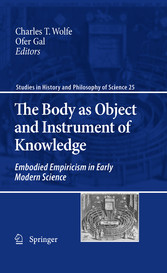Suchen und Finden
Mehr zum Inhalt

The Body as Object and Instrument of Knowledge - Embodied Empiricism in Early Modern Science
The Body as Object and Instrument of Knowledge
2
Title Page
4
Copyright Page
5
Contents
6
Contributors
8
Embodied Empiricism
12
Introduction
12
References
16
Victories for Empiricism, Failures for Theory: Medicine and Science in the Seventeenth Century
18
References
37
Practical Experience in Anatomy
42
1 Introduction
42
2 Natural Philosophical Anatomy, Practical Anatomy
47
3 Learned Surgery Returns from Exile?
53
4 ‘Class-Consciousness’ and the Venues of Anatomical Inquiry
59
5 Conclusion
62
References
64
Early Modern Empiricism and the Discourse of the Senses
67
1 Introduction
67
2 Five Texts
68
2.1 On Experience: Eden’s A Treatise of the New India (1553)
68
2.2 On Observation: William Cuningham’s The Cosmographical Glasse (1559)
69
2.3 On the Senses: George Chapman’s Ovids Banquet of Sence (1595)
71
2.4 On the Senses: Middleton’s The Triumphs of Truth (1613)
73
2.5 On Language, Reason and the Senses: Thomas Tomkis’ Lingua (1607)
76
3 The Discourse of the Senses and William Harvey’s Idea of Empiricism
79
References
82
Alkahest and Fire: Debating Matter, Chymistry, and Natural History at the Early Parisian Academy of Sciences
83
1 Introduction
83
2 Duclos’ Chymical Natural History of Plants
86
3 Dodart Enters the Arena: Natural History by Fire
92
4 “We Must Stay Within These Limits”: Empiricism
95
References
98
John Locke and Helmontian Medicine
101
1 Introduction
101
2 Medicine in England in the 1660s
102
3 Methodology
104
4 Chymistry
106
4.1 Locke and Mercurialist Chymistry
106
4.2 Locke and Helmontian Chymistry
113
5 Nosology and Therapeutics
116
6 Physiology
118
7 Conclusion
121
References
123
Part II
126
The Body as Instrument
126
Empiricism Without the Senses: How the Instrument Replaced the Eye
127
1 Introduction
127
2 Galileo: An Instrument for an Eye
128
3 Looking at the Sun
136
4 Kepler: the Eye as an Instrument
140
5 Epistemological Considerations
144
6 The Eye of the Mind
147
7 Conclusion: The Price
149
References
151
Mastering the Appetites of Matter. Francis Bacon’s Sylva Sylvarum
154
1 Introduction
155
2 A Physics of Material Appetites
156
3 Experimental Practice and Discipline of the Appetites
162
4 Conclusion
168
References
172
‘A Corporall Philosophy’: Language and ‘Body-Making’ in the Work of John Bulwer (1606-1656)
173
1 Introduction
174
2 ‘The Hand’ as Extended Mind
175
3 Foolish Bravery
178
4 Bulwer’s Stoic Anthropopoeia
183
5 Conclusion
186
References
187
Memory and Empirical Information: Samuel Hartlib, John Beale and Robert Boyle
188
1 Introduction
189
2 Samuel Hartlib and His Circle
191
3 Improving Memory, Enlarging Experience: Boyle’s Early Writings
197
4 Advice to Boyle
201
5 Conclusion
208
References
210
Lamarck on Feelings: From Worms to Humans
214
1 Introduction
215
2 Sentimens
218
3 “Sentiment Intérieur”
231
References
238
Part III
243
Embodied Minds
243
Carelessness and Inattention: Mind-Wandering and the Physiology of Fantasy from Locke to Hume
244
1 The Restless Mind
244
2 Carelessness and In-Attention
249
3 Pinnioning the Imagination
251
4 Conveying the Mischief: Body Fluids and Openness to Influence
254
5 Surpriz’d by Habit: Control and Error in Moral Physiology
257
6 Remedies for Reveries
259
References
261
Instrumental or Immersed Experience: Pleasure, Pain and Object Perception in Locke
265
1 Introduction
265
2 Locke’s Account of Sensation as Fitted to our Surroundings
266
3 Pleasure and Pain in Locke’s Account of Our Simple Ideas of Sensation
270
4 Pleasure and Pain and Our Ideas of Particular Substances
274
5 Resolving the Tensions in Locke: a Brief Overview of Empiricist Responses
278
5.1 Berkeley
278
5.2 Condillac
280
6 Locke’s Mixed Mind: Possible Explanations
283
References
284
Empiricism and Its Roots in the Ancient Medical Tradition
286
1 Introduction
286
2 The Kantian Turn
288
3 Empiricism à la Galen
290
4 Empiricism cum Scepticism
296
5 Perception of Empiricism and Scepticism
299
6 Kant’s Concept of Empiricism Revised
304
References
306
Embodied Stimuli: Bonnet’s Statue of a Sensitive Agent
308
1 Introduction
308
2 Bonnet’s Œconomy of Fibres of Organized Bodies
310
3 Organized Fibre Bodies and the Soul-Body-Interface
316
4 Concluding Remarks
326
References
328
Empiricist Heresies in Early Modern Medical Thought
331
References
340
Alle Preise verstehen sich inklusive der gesetzlichen MwSt.








